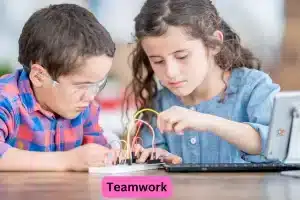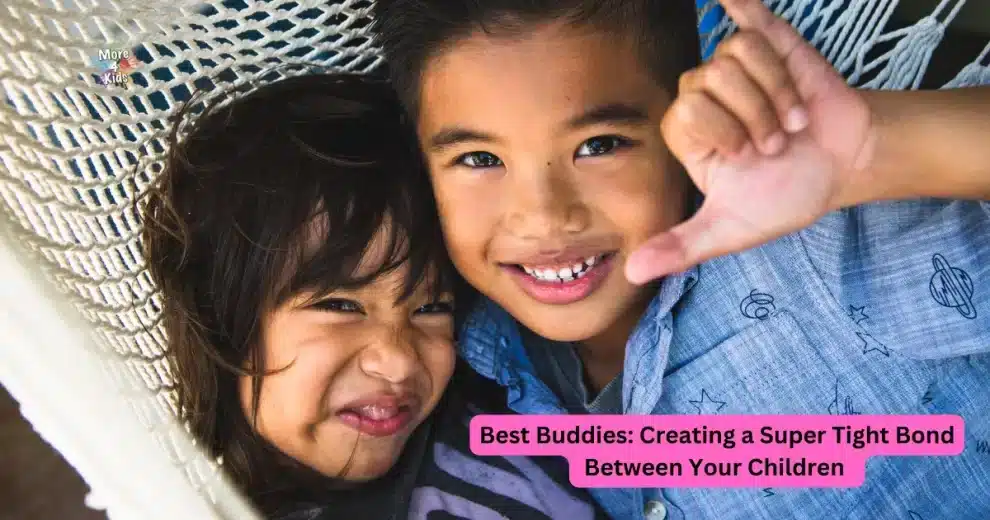Best Buddies: Creating a Super Tight Bond Between Your Children
Table of Contents
Having children who love to spend time with each other is every parent’s dream. Building great sibling relationships can be challenging for parents. It was one of my top goals from the moment my second child arrived two years after my first was born. I was close to my eight siblings when I was growing up, and still today, I consider many of them my closest friends.
Now, with my teenagers getting to the point where they’ll be adults soon, I think I’ve been successful with my mission in creating a strong bond between my children. My kids text each other frequently, even when they are only apart for a couple of hours, and they share the same group of friends. My youngest plans to attend the same college as her big brother, and I couldn’t be happier with their tight-knit relationship.
Here is everything I did to foster their love for one another over the years and encourage a real friendship as well.
Give Them Plenty of Togetherness
A good friendship needs great roots, and those are formed by time spent together. While I’ve always encouraged my children to have friends over, I’ve made sure to include plenty of time for just my kids to spend together.
This time is important because it allows them to form inside jokes and make those essential memories that will unite the two of them forever. Whether it was watching their favorite television show or hanging out in a hotel pool during our annual family vacation, my kids have had plenty of togetherness.
Give Them an Equal Amount of Chores
My door is always open to my kids’ friends, and a surprising number of them have told me they dislike their siblings because of the chore situation at home. Some of them complain they are required to do way more work than their siblings, and they’re resentful because of it. It’s hard for your kids to want to be close if they feel that one is treated differently than the other. As a parent, being fair about any household work will promote a great relationship between your kids.
When I was a kid, my brothers were given the so-called “male” tasks, like taking out the garbage or mowing a yard. My sisters and I generally helped with the tasks that were viewed as feminine, like cooking and vacuuming. And guess what? I was always jealous of the boys for getting to mow. Thankfully, times have changed, and gender roles are going away. Both my kids take out garbage, cook, and clean, regardless of gender.
My kids do have some chores they like more than the others. My son doesn’t mind taking the laundry downstairs, while my daughter would rather unload the dishwasher. I let them decide who is doing what, as long as they’re putting an equal amount of time in. And when there is a chore that they both hate – in their case, it’s vacuuming – they split it up equally.
Have Them Do Activities Together to Build Positive Sibling Relationships
With my kids only two years apart in age, I knew there would be a golden opportunity for them to participate in some extracurricular activities together at school. I didn’t just cross my fingers and hope they would sign up for the same activities – I encouraged it heavily.
Some of it happened organically. My daughter saw how much fun her older brother had on the Scholastic Bowl team in junior high and high school, so she signed up for the team as soon as she was old enough. Other activities required a little more encouragement, though. Convincing my daughter to join my son’s cross country team at the high school was a hard sell, but she eventually decided to try it and is continuing on the team even though her brother just graduated and is heading off to college.
They both have worked as paid baseball and softball umpires this summer, which creates another bond between them. Every shared experience strengthens their relationship by creating more mutual memories and giving them a greater understanding of each other.
If your children have completely different interests in extracurriculars or have such a big age gap that they won’t be able to join the same teams at the same time, there are other activities they can do together. On nice days during the summer, I tell my kids that they have to take a walk together. At first, they sometimes grumble about it because they’d rather be doing something else. But they almost always walk way longer than I told them to and laugh about the things they saw or did.
Let Them Troubleshoot as a Team
It’s easy to get along with others when things are going well. But when problems arise, you need to know you can really count on each other. That’s why I like to see my children in situations where they need to rely on each other and work together to solve a problem, such as fighting their way through a computer issue. Read our article on how to understand the difference between sibling rivalry and sibling bullying.

When our kids unwrapped the box, we told them they would have to work together to figure out how to open the puzzle box and that they would have to unscramble the message inside. Then we sat back and watched as they took turns and offered suggestions for opening the box. They loved it, and we enjoyed watching their teamwork and problem-solving skills in action.
Never Compare Them to Each Other

You should watch what you say to your children and your tone of voice while talking with them. Avoid making statements that compare your children to each other in a negative way, such as “Why can’t you keep your room neater like your brother does?” or “I wish your grades were as good as your sister’s grades.”
Statements like that pit your children against each other, building resentment rather than making them closer. Even if you aren’t making direct comparisons through your words, you might be doing so through your tone of voice. It’s something to be mindful of because it can have a huge impact on how your children view you, themselves, and each other.
FAQs
How can I encourage my children to spend more time together?
Encourage activities that both children enjoy and can participate in together. This could be watching a favorite TV show, playing a game, or going on family vacations. Shared experiences foster stronger sibling bonds.
How can I avoid creating resentment between my children?
Avoid making comparisons between your children. Each child is unique with their own strengths and weaknesses. Comparisons can create a sense of competition and resentment.
How can I help my children build a strong bond if they have a significant age gap?
Encourage the older child to take on a mentor role for the younger one. They can share their experiences, teach them new skills, and provide guidance.
How can extracurricular activities help in strengthening the bond between my children?
Participating in the same activities or teams allows your children to create shared memories and understand each other better. It also provides them with common topics of conversation.
How can I ensure fairness in household chores among my children?
Assign chores without gender bias and ensure that each child is contributing an equal amount of effort. This promotes a sense of fairness and reduces resentment and helps create better sibling relationships.
How can I teach my children to work as a team?
Encourage situations where they need to rely on each other to solve a problem is a great way to help siblings bond. This could be a puzzle or a task that requires teamwork. It will help them learn to collaborate and trust each other.
How can I foster better sibling relationships between my children if they have different interests?
Encourage them to share their interests with each other and participate in each other’s activities. This will help them appreciate their differences and learn new things.
How can I ensure that my children maintain their close bond as they grow older?
Encourage open and honest communication between them. Also, continue to foster shared experiences and memories as they grow older.
How can I help my children resolve conflicts between them?

Teach them to communicate their feelings and find a resolution together. Avoid taking sides and encourage them to see each other’s perspectives.
How can I help my children support each other during difficult times?
Encourage them to be there for each other during challenging times. They can provide emotional support, help each other problem-solve, and offer comfort.














Add Comment